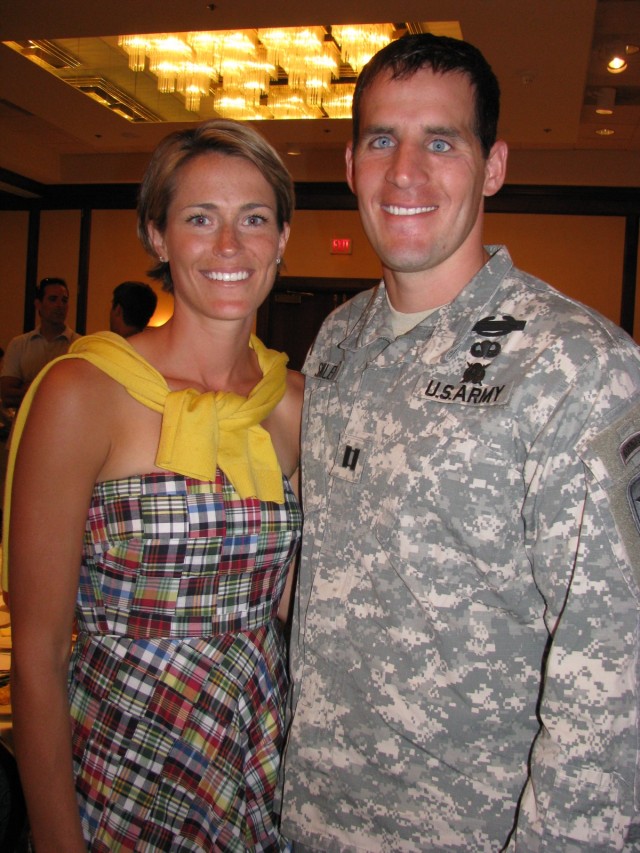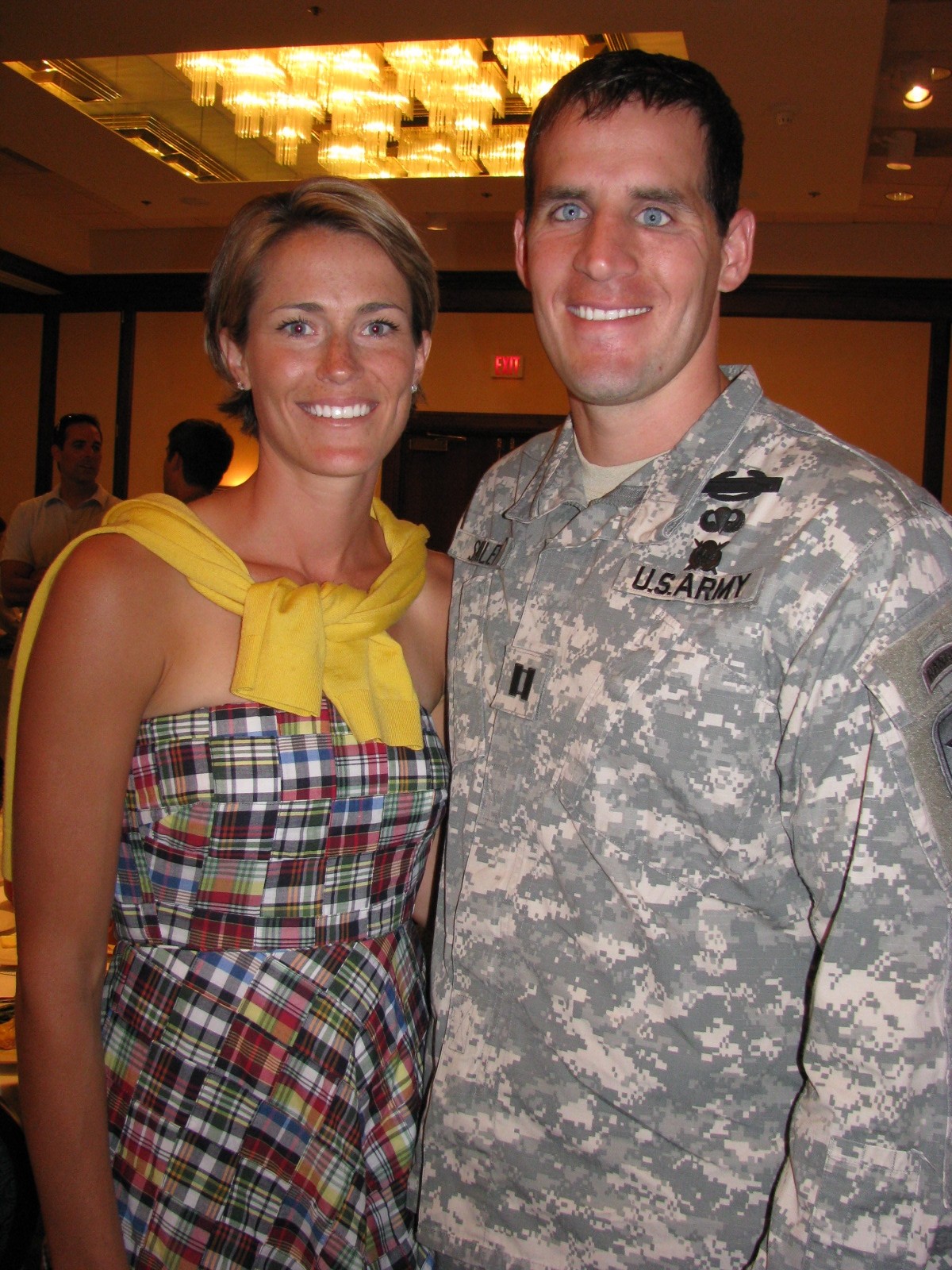
Named the 2007 Soldier of the Year by Army Times, Capt. Scott Smiley is a living example of the Soldier's creed.
Every day, he puts the mission first and refuses to accept defeat.
He is disciplined, physically and mentally tough, and proficient in his warrior tasks and drills.
He is ready to engage and destroy the enemies of the U.S.
He is a guardian of freedom and the American way of life.
And, he is blind.
Smiley is one of three Soldiers who have continued to pledge their service to their country despite war injuries that have left them sightless. Since the war began in Iraq, more than 100 Soldiers have been blinded and 247 have lost sight in one eye.
The Blinded Veterans Association estimates 13 percent of all combat hospital emergency procedures in Iraq have involved eye injuries and more than half of the Soldiers with traumatic brain injuries also suffer some visual impairment, making eye injuries the third most common injury - behind post traumatic stress disorder and brain injuries - in Iraq.
Yet, because of today's technology, a deep faith in God and a sheer determination to continue his Army mission, Smiley has remained a productive and successful Soldier.
Speaking to members of the local chapter of the Christian-based Young Business Leaders organization at a June 27 luncheon at the Huntsville Marriott, Smiley told how his faith in God, the support of his family and his belief in the Army values helped him accept and overcome the injuries he sustained when a car bomb went off as he led his platoon of Stryker Soldiers on patrol in Mosul, Iraq, in April 2005.
"My faith has allowed me to be the man I am today," he said. "Don't look at the hardships, pain, agony, strife. Look at what God has given you, and your ability to glorify Him and praise Him.
"I know that it is tough, that it is hard. I miss seeing my beautiful wife. I miss not being able to see my son (1-year-old Grady). But my attitude and faith carry me through each day. I know God has trusted and loved me, and will always love me, and I look at life and everyone else through the love God has shown me."
Smiley still lives his life based on the seven Army values: loyalty, duty, respect, selfless service, honor, integrity and personal courage. But it is a Soldier's commitment to personal courage - the ability to face fear, danger or adversity - that led Smiley to "rely on Jesus Christ, my Lord and Savior, allowed me to withstand the blast and saved my life, allowed me to be a happy man and enjoy my life now."
Even before his injuries, Smiley led his life based on the Christian values he was taught as a child, values that were later restated in the cadet honor code lived by this West Point graduate and put to the test in Iraq, where he was a platoon leader for Alpha Company, 1st Battalion, 24th Infantry, 25th Infantry Division.
Those values were the "basis to do what's right on the battlefield," he said. "Each day, I was in charge of a 45-man platoon. My faith helped me to make the right decisions on which doors to knock down, which people to save, which lives to take" while facing the threat of insurgent attacks in Mosul.
But the true test of his faith and values came on April 6, 2005, as Smiley and his platoon searched for suicide bombers on the supply routes around Mosul.
"We were fighting terrorists on a daily basis," he recalled. "There were fire fights, IEDs (improvised explosive devices), people getting injured all the time."
Smiley and his Soldiers knew there was military intelligence information stating suicide bombers were in the area.
"It was personal courage that kept me going. I had the courage to still do my job, to lead my men, to not stay hidden, to help the Iraqi people," he said. "Personal courage brought me out that day and I believe helped me to do the right thing."
While on patrol, Smiley came across a man parked in a car that was sitting low to the ground.
"We had strict rules of engagement that didn't allow us to do anything," Smiley said, adding that the man could have been moving heavy items in his car, could have been from out of town and lost, or could have been a suicide bomber. In a war fought among civilians, Soldiers are not allowed to shoot based solely on suspicion.
"I yelled at the man to get out of the car," he continued. "He raised his hands and moved forward. I shot around the vehicle, and he stopped and raised his hands. He started coming forward again. I shot another round. Then, boom! And everything went black. When I woke up a week later, my life had really changed."
Smiley was relieved to learn that he and the suicide bomber were the only ones injured in the blast. "Personal courage saved my men's lives and the lives of Iraqis," he said.
But, sadly, he learned the cost of his personal courage was the loss of both eyes and the frontal lobe of his brain, all damaged beyond repair by flying shrapnel that cut through his ballistic glasses. He remembered the early days of his recovery, when his wife Tiffany and his family would take turns reading Bible verses to him. He remembered a friend bringing his guitar on visits and singing praise songs for him.
"The Bible gave me encouragement, and I had a survival instinct to fight and love the Lord," he said. "I felt the Lord's spirit on me."
And, Smiley saw a chance to continue to serve. He was assigned to the Individual Training Assessment Team, Army Accessions Command at Fort Monroe, Va., under the Wounded Warriors Program. In that position, he advised other wounded warriors about Army resources available to them, provided expertise on enemy tactics and wartime training needs at various military training centers, and led an effort to rewrite training and doctrine regulations.
"Technology is getting more and more advanced, and is providing me with the ability to work and still contribute," he said. "From the business standpoint of the Army, they have invested so much in my education and knowledge. They know that 'Yes, he's injured. But he's not useless.' By allowing me to still contribute the Army is showing they are not leaving fallen comrades behind."
Smiley has also spoken about his faith and his Army experience to various groups, including the U.S. national basketball team as they prepared for the world championships.
Personally, his life has been enriched by the birth of his son. And, despite his blindness, Smiley has surfed in Hawaii, skied in Colorado, skydived in Texas and climbed Mt. Rainier in Washington. His visit in Huntsville included time with the family of fellow West Point graduate Capt. David Webb, who was serving with Smiley in Iraq in 2005 and who is preparing for his fifth deployment.
Smiley is studying for a master's degree from Duke University and, upon graduation in a year, he will teach leadership classes at West Point. He hopes to make a difference in the lives of young Soldiers studying at his alma mater.
"I hope they can look at the examples I give and I pray they all become Christians," he said of his future students. "I hope they learn about leadership from me, and why they want to be there and why they want to serve."
He is excited about the opportunity to teach young Soldiers about Army leadership and to share with them what it was like to fight for freedom in Iraq.
"Soldiers who are serving in Iraq know we are making a change for the country's people. But it's going to take time," he said. "Our Soldiers who are serving in Iraq are awesome. They are very honorable. I look to all of them as my heroes."
Smiley hopes his designation as the Army Times Soldier of the Year will provide him with more opportunities to share his faith and his Army experience with people from all walks of life.
"I was definitely surprised when I heard I won it," he said. "So many Soldiers out there have done so much and haven't been recognized. Thousands and thousands are giving their lives in service to their country each and every day. I prefer not to be recognized because there are so many others who are deserving. But at the same time it's awesome to be an example for other Soldiers."
Although he can't physically see, Smiley said "every day I look at what the Lord has blessed me with. I am so thankful. I definitely could retire. But the service I'm able to give to my country means so much more to me than doing something for myself."
Today, it is the Army value of selfless service - putting the welfare of the nation, Army and subordinates before his own -- "that continues to feed me and give me strength," Smiley told his audience. "It is selfless service that allows me to continue to grow and give my life to God ... I encourage you to live a life of thankfulness and gratitude."

Social Sharing